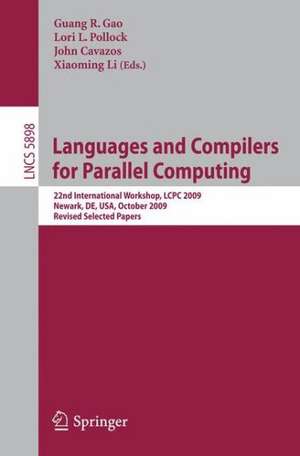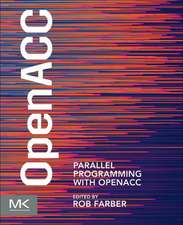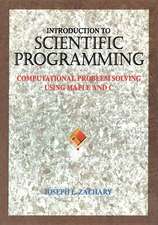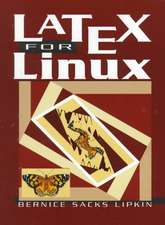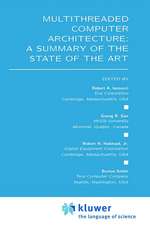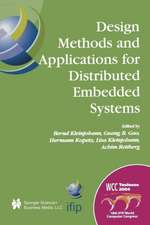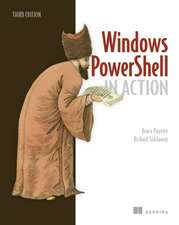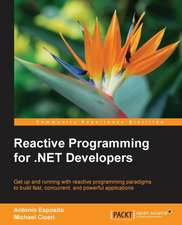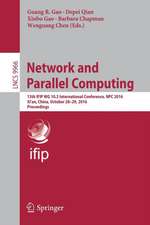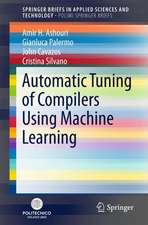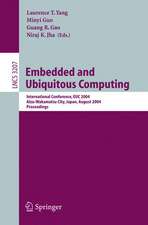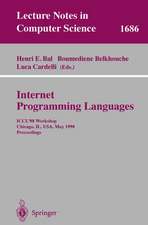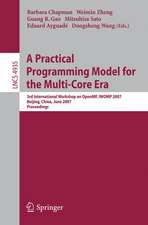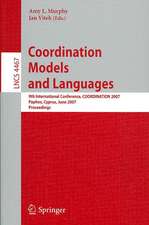Languages and Compilers for Parallel Computing: 22nd International Workshop, LCPC 2009, Newark, DE, USA, October 8-10, 2009, Revised Selected Papers: Lecture Notes in Computer Science, cartea 5898
Editat de Guang R. Gao, Lori Pollock, John Cavazos, Xiaoming Lien Limba Engleză Paperback – 9 iun 2010
Din seria Lecture Notes in Computer Science
- 20%
 Preț: 1061.55 lei
Preț: 1061.55 lei - 20%
 Preț: 307.71 lei
Preț: 307.71 lei - 20%
 Preț: 438.69 lei
Preț: 438.69 lei - 20%
 Preț: 579.30 lei
Preț: 579.30 lei -
 Preț: 410.88 lei
Preț: 410.88 lei - 17%
 Preț: 427.22 lei
Preț: 427.22 lei - 20%
 Preț: 596.46 lei
Preț: 596.46 lei - 15%
 Preț: 448.04 lei
Preț: 448.04 lei - 20%
 Preț: 353.50 lei
Preț: 353.50 lei -
 Preț: 389.49 lei
Preț: 389.49 lei - 20%
 Preț: 309.90 lei
Preț: 309.90 lei - 20%
 Preț: 645.28 lei
Preț: 645.28 lei - 20%
 Preț: 763.23 lei
Preț: 763.23 lei - 15%
 Preț: 580.46 lei
Preț: 580.46 lei - 20%
 Preț: 310.28 lei
Preț: 310.28 lei - 20%
 Preț: 655.02 lei
Preț: 655.02 lei - 20%
 Preț: 1183.14 lei
Preț: 1183.14 lei - 20%
 Preț: 340.32 lei
Preț: 340.32 lei -
 Preț: 449.57 lei
Preț: 449.57 lei - 20%
 Preț: 591.51 lei
Preț: 591.51 lei - 18%
 Preț: 938.83 lei
Preț: 938.83 lei - 20%
 Preț: 337.00 lei
Preț: 337.00 lei - 20%
 Preț: 649.50 lei
Preț: 649.50 lei - 20%
 Preț: 607.40 lei
Preț: 607.40 lei - 20%
 Preț: 1414.79 lei
Preț: 1414.79 lei - 20%
 Preț: 1024.44 lei
Preț: 1024.44 lei - 20%
 Preț: 583.40 lei
Preț: 583.40 lei - 20%
 Preț: 453.32 lei
Preț: 453.32 lei - 20%
 Preț: 575.49 lei
Preț: 575.49 lei - 20%
 Preț: 1075.26 lei
Preț: 1075.26 lei - 20%
 Preț: 585.88 lei
Preț: 585.88 lei - 20%
 Preț: 825.93 lei
Preț: 825.93 lei - 17%
 Preț: 360.20 lei
Preț: 360.20 lei - 20%
 Preț: 763.23 lei
Preț: 763.23 lei - 20%
 Preț: 340.32 lei
Preț: 340.32 lei - 20%
 Preț: 504.58 lei
Preț: 504.58 lei - 20%
 Preț: 369.13 lei
Preț: 369.13 lei - 20%
 Preț: 580.93 lei
Preț: 580.93 lei - 20%
 Preț: 343.62 lei
Preț: 343.62 lei - 20%
 Preț: 350.21 lei
Preț: 350.21 lei - 20%
 Preț: 583.40 lei
Preț: 583.40 lei - 20%
 Preț: 583.40 lei
Preț: 583.40 lei - 15%
 Preț: 438.59 lei
Preț: 438.59 lei - 20%
 Preț: 341.95 lei
Preț: 341.95 lei - 20%
 Preț: 238.01 lei
Preț: 238.01 lei - 20%
 Preț: 538.30 lei
Preț: 538.30 lei
Preț: 341.15 lei
Preț vechi: 426.44 lei
-20% Nou
Puncte Express: 512
Preț estimativ în valută:
65.29€ • 67.91$ • 53.90£
65.29€ • 67.91$ • 53.90£
Carte disponibilă
Livrare economică 24 martie-07 aprilie
Preluare comenzi: 021 569.72.76
Specificații
ISBN-13: 9783642133732
ISBN-10: 3642133738
Pagini: 440
Ilustrații: XI, 426 p. 186 illus.
Greutate: 0.66 kg
Ediția:2010
Editura: Springer Berlin, Heidelberg
Colecția Springer
Seriile Lecture Notes in Computer Science, Theoretical Computer Science and General Issues
Locul publicării:Berlin, Heidelberg, Germany
ISBN-10: 3642133738
Pagini: 440
Ilustrații: XI, 426 p. 186 illus.
Greutate: 0.66 kg
Ediția:2010
Editura: Springer Berlin, Heidelberg
Colecția Springer
Seriile Lecture Notes in Computer Science, Theoretical Computer Science and General Issues
Locul publicării:Berlin, Heidelberg, Germany
Public țintă
Professional/practitionerCuprins
A Communication Framework for Fault-Tolerant Parallel Execution.- The STAPL pList.- Hardware Support for OpenMP Collective Operations.- Loop Transformation Recipes for Code Generation and Auto-Tuning.- MIMD Interpretation on a GPU.- TL-DAE: Thread-Level Decoupled Access/Execution for OpenMP on the Cyclops-64 Many-Core Processor.- Mapping Streaming Languages to General Purpose Processors through Vectorization.- A Balanced Approach to Application Performance Tuning.- Automatically Tuning Parallel and Parallelized Programs.- DFT Performance Prediction in FFTW.- Safe and Familiar Multi-core Programming by Means of a Hybrid Functional and Imperative Language.- Hierarchical Place Trees: A Portable Abstraction for Task Parallelism and Data Movement.- OSCAR API for Real-Time Low-Power Multicores and Its Performance on Multicores and SMP Servers.- Programming with Intervals.- Adaptive and Speculative Memory Consistency Support for Multi-core Architectures with On-Chip Local Memories.- Synchronization-Free Automatic Parallelization: Beyond Affine Iteration-Space Slicing.- Automatic Data Distribution for Improving Data Locality on the Cell BE Architecture.- Automatic Restructuring of Linked Data Structures.- Using the Meeting Graph Framework to Minimise Kernel Loop Unrolling for Scheduled Loops.- Efficient Tiled Loop Generation: D-Tiling.- Effective Source-to-Source Outlining to Support Whole Program Empirical Optimization.- Speculative Optimizations for Parallel Programs on Multicores.- Fastpath Speculative Parallelization.- PSnAP: Accurate Synthetic Address Streams through Memory Profiles.- Enforcing Textual Alignment of Collectives Using Dynamic Checks.- A Code Generation Approach for Auto-Vectorization in the Spade Compiler.- Portable Just-in-Time Specialization of DynamicallyTyped Scripting Languages.- Reducing Training Time in a One-Shot Machine Learning-Based Compiler.- Optimizing Local Memory Allocation and Assignment through a Decoupled Approach.- Unrolling Loops Containing Task Parallelism.
